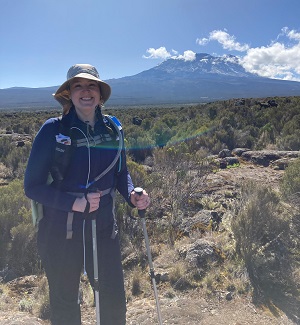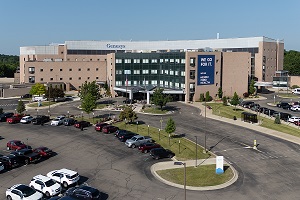Henry Ford Health System Kidney Donor Hikes Mount Kilimanjaro to Raise Awareness for Living Organ Donation

DETROIT (March 17, 2022) – For anyone who may have unease about what their life may be like after living kidney donation, a Henry Ford Health System kidney donor who recently hiked the world’s tallest freestanding mountain has a message of fulfillment and inspiration.
Emily Polet-Monterosso was among 22 members of the Kidney Donor Athletes (KDA) who made the trek up Mount Kilimanjaro in Tanzania, Africa. Each member had donated a kidney to someone in need, and she was the only donor from Michigan. Their goal was to raise awareness about living kidney donation and dispel the myth that organ donors can’t live healthy lives afterward.
 At its peak, Mount Kilimanjaro stands at 19,341 feet above sea level. Polet-Monterosso said she struggled with altitude sickness during the eight-day hike in reaching the second highest point on the mountain at 15,000 feet on March 8. It was a remarkable achievement for a feat that tests your endurance and physical, mental and emotional strength. Temperatures ranged from the mid-90s in the early stages of the hike to freezing as the mountaintop drew closer.
At its peak, Mount Kilimanjaro stands at 19,341 feet above sea level. Polet-Monterosso said she struggled with altitude sickness during the eight-day hike in reaching the second highest point on the mountain at 15,000 feet on March 8. It was a remarkable achievement for a feat that tests your endurance and physical, mental and emotional strength. Temperatures ranged from the mid-90s in the early stages of the hike to freezing as the mountaintop drew closer.
Twenty KDA members completed the final leg of the hike to reach the summit on March 10.
“I have never been more proud of myself for what I accomplished,” said Polet-Monterosso, a resident of Shelby Township. “I’ve never done anything that hard. It was a very inspirational thing to be part of.”
Polet-Monterosso said the goal of the hike was less about how far you got up the mountainside and more about demonstrating that people who donate can continue to enjoy a rewarding, active and healthy lifestyle.
“It’s the most worthwhile thing I’ve ever done,” she said of her kidney donation. “Anyone can do this. It’s not a super-hero thing.”
Polet-Monterosso’s decision to donate was one of happenstance. In August 2018 she came across a social media posting her sister sent. The post showed a sign displayed in the rear windshield of a car with a message in yellow and pink lettering: “Single Dad of 3 Needs Type O Kidney” and a phone number. Knowing she had the same blood type from years of donating blood, Polet-Monterosso called the number.
During a living donor transplant on Jan. 9, 2019 at Henry Ford Hospital in Detroit, her donated kidney saved the life of that Single Dad, Ryan Stanford. The two have stayed in touch since, and Polet-Monterosso and her mom attended Stanford’s wedding in 2021.
“It was the best happenstance of my life,” she said. “It was an opportunity for me to feel like I made a difference.” She credited her husband Kim with championing her cause with “incredible enthusiasm” and “being supportive of me.”
Polet-Monterosso admitted she was not physically active before becoming an organ donor. She was spurred to “get fit” for surgery and in doing so, found a love for athletics. Two weeks after surgery, she was in the gym working out and several months later embarked on the grueling challenge of a Spartan Trifecta – completing three obstacle course races in a calendar year. She succeeded and the experience helped her during the Mount Kilimanjaro hike. So, too, did the hours of hiking around Stony Creek Metropark with weights in her backpack and walking countless numbers of stairs.
“While it’s the tallest freestanding mountain in the world, it’s considered climbable because it doesn’t require technical skills,” she said just days before departing for Africa. “It’s basically a hike with high elevation. But you have to be able to brave the elements and manage the effects of altitude sickness and brave the cold weather at the top. If you have some internal grit and determination, you can do it.”
The Henry Ford Transplant Institute at Henry Ford Hospital is the most comprehensive organ transplant program in Michigan, offering transplantation of the liver, kidney, pancreas, intestine and multivisceral organs, heart, lung and bone marrow stem cell. An estimated one-third of the 17,000 kidneys donated nationally every year come from “living donors” like Polet-Monterosso. Kidneys received from living donors optimally function for 12 to 15 years, nearly three times longer than those from deceased donors. They also eliminate the need for the recipient to go on dialysis after surgery.
Candidates for living donation undergo a comprehensive medical and mental evaluation to determine their eligibility. This includes a physical exam, mental health assessment, blood screenings and imaging scans of the kidneys. The age of donors ranges from 18 to 70 years old. People with certain chronic health conditions like cancer, heart disease and diabetes cannot donate.
Surgeons use minimally invasive laparoscopic and robotic-assisted procedures during organ transplant surgery. Both techniques involve smaller incisions and patients return to their normal activities sooner than the traditional surgical method. Polet-Monterosso had her kidney removed robotically.
Henry Ford’s Center for Living Donation provides a “concierge level experience” for people willing to donate a kidney or liver, said Jason Denny, M.D., Surgical Director of the Living Donor Kidney Transplant Program and director of the Center for Living Donation. He was part of Polet-Monterosso’s evaluation in December 2018.
“Kidney and liver living donors are awesome people to begin with. They stop to think about someone else when others keep walking,” he said. “Our goal is to get our donors back to the life they had before they decided to help someone. Emily is a great example of that.”
Dr. Denny said living donation allows the donor and recipient to arrange the transplant well in advance of the recipient becoming critically ill. Henry Ford also uses computer software to match an altruistic donor – one who doesn’t have an intended recipient – with one on the waiting list. Currently, more than 2,000 people in Michigan are on the waiting list for a donated kidney.
Rohini Prashar, M.D., a nephrologist and Medical Director of Henry Ford’s Living Donor Kidney Transplant Program, said donors are followed by their post-transplant team for two years to monitor their health. Some former donors are healthier at that two-year mark than when they began their donor journey, she said.
“Emily is setting an example for so many other people around the world that donating an organ does not put you at any kind of disadvantage,” said Dr. Prashar, who is also Associate Medical Director of the Center for Living Donation. “You can have a perfectly normal life with one kidney.”
As Polet-Monterosso reflects on her donation, she likens it to having two sandwiches and knowing that someone is starving and needing one of them to stay alive.
“I wish I had the opportunity to do it sooner,” she said. “If it’s on your heart to try and do this, get evaluated. There’s 100,000 people (currently 97,451, according to the Organ Procurement & Transplantation Network) on the (national kidney) waiting list and if you donate, you change the situation for all 100,000. If you help the top person, then that bumps up everyone else one step closer to getting a life-saving kidney one day.”
###
NEWS MEDIA ONLY may contact: David Olejarz / David.Olejarz@hfhs.org / 313-303-0606
.svg?iar=0&hash=F6049510E33E4E6D8196C26CCC0A64A4)

/hfh-logo-main--white.svg?iar=0&hash=ED491CBFADFB7670FAE94559C98D7798)







